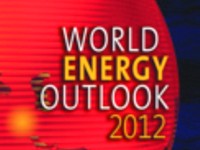Golden Rules for a Golden Age of Gas
 The International Energy Agency has released an excellent free report, part of the World Energy Outlook series, that presents analytical insights into trends in energy markets and what they mean for energy security, environmental protection and economic development.
The International Energy Agency has released an excellent free report, part of the World Energy Outlook series, that presents analytical insights into trends in energy markets and what they mean for energy security, environmental protection and economic development.Natural gas is poised to enter a golden age, but this future hinges critically on the successful development of the world’s vast unconventional gas resources.
North American experience shows unconventional gas - notably shale gas - can be exploited economically. Many countries are lining up to emulate this success.
But some governments are hesitant, or even actively opposed. They are responding to public concerns that production might involve unacceptable environmental and social damage.
This International Energy Agency report, part of the World Energy Outlook series, treats these aspirations and anxieties with equal seriousness.
It features two new cases: a Golden Rules Case, in which the highest practicable standards are adopted, gaining industry a “social licence to operate”; and its counterpart, in which the tide turns against unconventional gas as constraints prove too difficult to overcome.
The report:
•Describes the unconventional gas resource and what is involved in exploiting it.
•Identifies the key environmental and social risks and how they can be addressed.
•Suggests the Golden Rules necessary to realise the economic and energy security benefits while meeting public concerns.
•Spells out the implications of compliance with these rules for governments and industry, including on development costs.
•Assesses the impact of the two cases on global gas trade patterns and pricing, energy security and climate change
“The technology and the know-how already exist for unconventional gas to be produced in an environmentally acceptable way”, says IEA Executive Director Maria van der Hoeven. “But if the social and environmental impacts are not addressed properly, there is a very real possibility that public opposition to drilling for shale gas and other types of unconventional gas will halt the unconventional gas revolution in its tracks.”
The Golden Rules underline that full transparency, measuring and monitoring of environmental impacts and engagement with local communities are critical to addressing public concerns.
What are the Golden Rules?
•Measure, disclose and engage
•Watch where you drill
•Isolate wells and prevent leaks
•Treat water responsibly
•Eliminate venting, minimize flaring and other emissions
•Be ready to think big
•Ensure a consistently high level of environmental performance
“If this new industry is to prosper, it needs to earn and maintain its social license to operate,” notes IEA Chief Economist Fatih Birol. “This comes with a financial cost, but in our estimation the additional costs are likely to be limited.”
The IEA report has stirred controversy in some quarters. Some environmentalists are infuriated with the statement that natural gas use could grow more than 50% by 2035 if local problems with shale extraction can be overcome, noting that only in the last paragraph does it say this would be inconsistent with a global temperature rise of 2 degrees Centigrade.
The report does not warn that the natural gas boom could lead to a potentially devastating 3.5 degree Centigrade rise until page 91 of the full report.
You can return to the main Market News page, or press the Back button on your browser.

